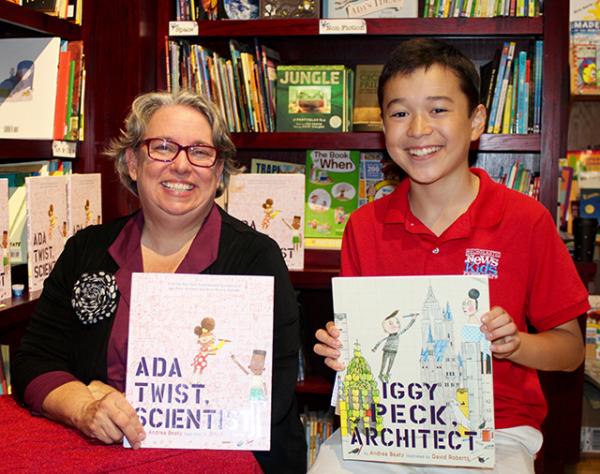KID REPORTERS’ NOTEBOOK
A Q&A with Author Andrea Beaty


Max and children's book author Andrea Beaty at Blue Bunny Books in Dedham, Massachusetts
Andrea Beaty’s book, Ada Twist, Scientist, recently hit #1 on The New York Times bestseller list. Her other STEM (Science, Technology, Engineering, and Mathematics) books, Iggy Peck, Architect and Rosie Revere, Engineer (holding strong at 71 weeks on the list), are also widely popular among kids, parents, and teachers. All three books, illustrated by David Rogers, feature boys and girls who are fun, funny, curious, creative, passionate, and persistent. Beaty’s beloved characters prove that all kids can be anything they want to be.
On September 19, I met Beaty at a book signing at Blue Bunny Books in Dedham, Massachusetts. Here are excerpts from our conversation.
What inspired you to write STEM-themed picture books?
I didn’t start off thinking that I was going to write STEM books. It just happened. My background is in science, and I have a degree in biology and computer science. I love science! We have a lot of problems in the world that need solving, and we need scientists, artists, engineers, and mathematicians. We need smart kids out there learning and coming up with solutions.
How did you come up with your characters?
I wrote Iggy Peck, Architect because my son liked to build things. When I wrote the story, David Roberts did the illustrations and created a whole class of kids. When I saw the illustrations, I thought, These kids have stories. Kids are cool. They are interested in things. They are smart, They are creative. They all have things they do. I look at the pictures, and I look for clues. I try to figure out who these kids are and what they are doing. Then I see where it goes.
What was your favorite subject in school?
I loved reading, grammar, and literature. We didn’t really do a lot of science, and we didn’t really do art. We didn’t have some of the wonderful things that schools now focus on. We didn’t have a school library. I went to the public library. Also, I had a lot of books in my house. Public television had a big influence on me, and I watched a lot of science shows like the original Cosmos. And the new Cosmos is brilliant.
Do you remember a science experiment that you did as kid?
I kept a collection of earthworms in a cigar box. They were kind of my science experiments/pets. They were very cool until I put my toothbrush in there. Then my mom said they all had to go, so I didn’t have earthworms or a toothbrush anymore. [She laughs.]
What are your hobbies and interests?
I love gardening, biking, and reading. Reading is the big one. I also like to do research. And I like traveling a lot.
What is your advice for young inventors?
Make things. Try them, and if they don’t work, figure out why not. Figure out if the thing that failed actually leads you to a new thing. So many great inventions happen by accident. They happen because people don’t give up. Failure is an important part of the process. It’s how you learn. If things are easy, and you don’t have to think harder or struggle, or try things over and over again, then you miss the opportunity to really understand what you are trying to do.
What is your advice for young writers?
It’s exactly the same. Just keep trying. Keep writing. It’s not going to be perfect the first time, or the second time, or the third time, or the tenth time. And read all the time. Read everything you can. Read poetry every day. Poetry teaches you how to use language to its fullest, most powerful effect. Poetry takes the most complicated emotions and boils them down to the strongest words.
If you could invent anything, what would it be?
I would invent a machine that lets people really understand other people, and I don’t mean just their languages, but how they feel. In a way, that machine has already been invented. It’s called fiction. I think that fiction/story is the greatest invention. With story, you can experience other people’s lives. We have to learn to be more empathetic and realize that we are more alike than different. We can do amazing things when we work together instead of working against each other.
